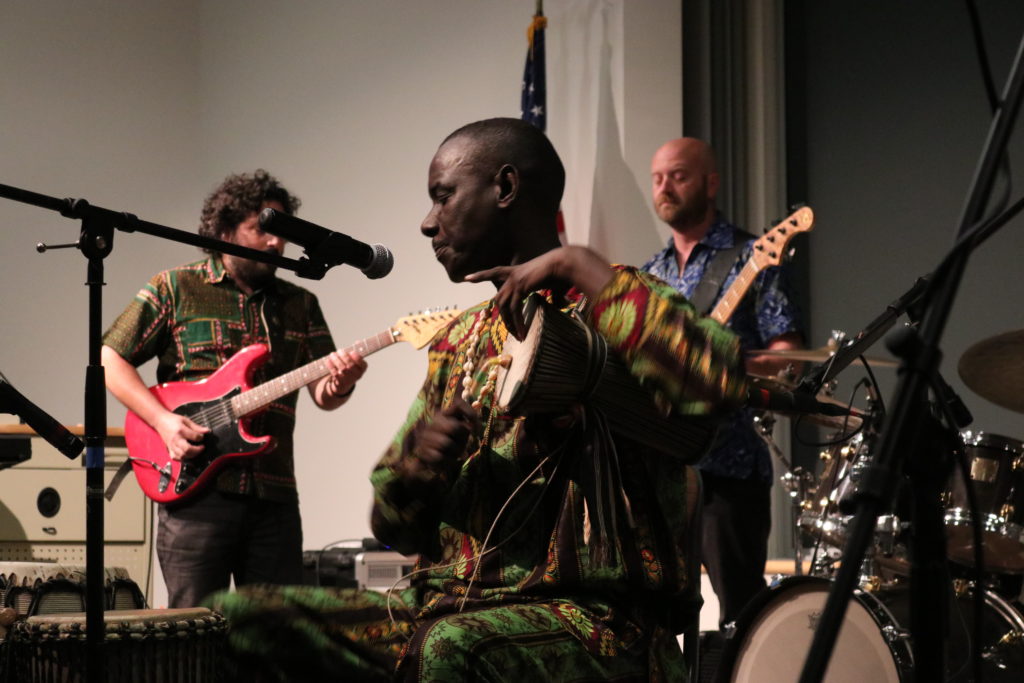“Massamba has maintained a generational engagement with the world as a griot musician for decades” said Sky Wilson, Student Diversity Center adviser, introducing Massamba Diop’s “African Storytelling and the Rhythms of Black Panther” event on Sept. 12. Wilson added that this position makes Diop “a cultural teacher, master of ceremony [and] troubadour historian.”
Diop (pronounced jope) spent little time introducing the lineup of drums on stage before narrowing his focus to the smallest drum, the tama. According to Diop, his life story is largely the story of the tama player, also known as the ‘griot’ in West African culture.
“It breathes…and it talks,” Diop said, referencing the tama.
Most recently, Diop has received recognition for his contribution to the soundtrack of Marvel’s blockbuster “Black Panther.” His drumming can be heard in King T’Challa’s theme song, played whenever the character makes an entrance in the film. This is not a novel instrumental accompaniment, by Diop’s account.
“When the head of the town calls a meeting, they call a tama player,” Diop explained.
Diop said he began playing the tama drum as a child when he decided to continue his father’s legacy as a griot musician and vital communicator for the Walo Walo people of Senegal, West Africa.
Diop stressed the importance of a griot’s responsibility to dispense ancestral knowledge. He said, “When you come to my house, when you say your last family name, my father can tell you 200 years ago from you. From this, this, this, this… to you.”
Diop said the tama is also used to communicate between villages.
“All the way down through Africa, one by one the towns play,” he said.
Diop has performed with musicians such as James Brown, Carlos Santana and Harry Belafonte, as well as at international events like Oslo’s 2004 Nobel Peace Prize ceremony and the London 2012 Olympics, Wilson said. Diop, who regularly tours the northeast, is currently touring the West Coast. Throughout the month, Diop will conduct workshops, storytelling and drumming at venues in and between San Francisco and Seattle.
Diop described university performances as being an exchange between all attending parties.
“If you play, you know what you do, you love what you do, you show the student or audience what you have. Each one, they have something different, not the same idea,” Diop said.
During the storytelling segment of the event, family traditions and cultures were shared and compared. Diop later harmonized with accompanying musicians who were equipped with instruments like the drums, guitar and saxophone. These musicians have a temporary presence in Diop’s international music project, “Walo Walo.”
Diop focused on the audience by racing around the room with the microphone, prompting attendees to return his chant of “Walo Walo!” He even brought a few audience members on stage to dance to his instruction.
Wilson explained this open exchange of cultural narratives is pivotal to the Diversity Center’s mission.
“Having access to each other’s narratives and the way we tell stories is really important to being able to connect with each other,” Wilson said.
“We are [cultural influencers and makers] too, so one of my big priorities for this center [Student Diversity Center] is to provide a space for students to produce the culture of our campus, to produce the culture of our region and our world,” Wilson said. “[To engage] with other people who are doing that work I think is really important.”
When asked about what makes university performances different from other venues, Diop said the younger generations are most important to consider in sharing his message.
“When you have a 25 years to 30 to 40 years come to my show…you see something, in your heart you keep it,” Diop said.
Many of the griot qualities, as explained by Diop, resemble qualities Wilson considers key to a culturally rich campus.
“Griots serve to strengthen the connected issues that link our historical narratives, our present and the future which we create,” Wilson said.
Another opportunity to hear Massamba Diop perform live afrojazz music, takes place on Sept. 29 at Akadi African restaurant in Portland.
